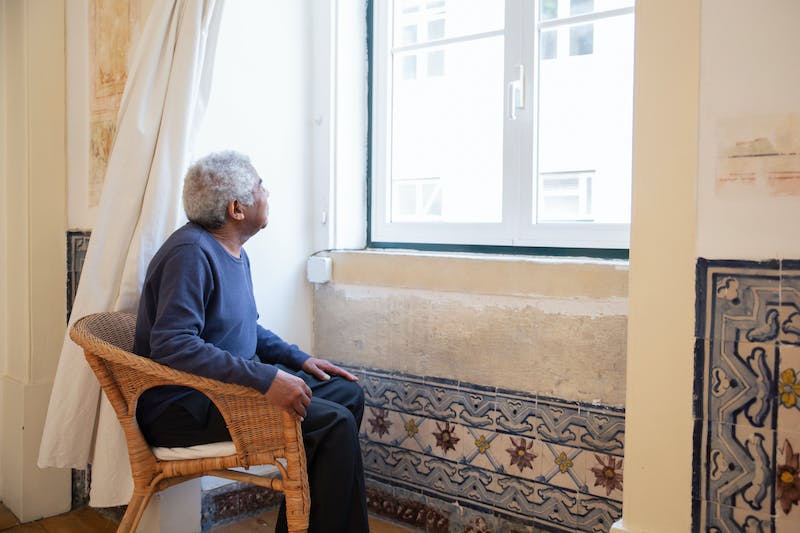Inclusion Programs
Dignity Hospice™ has developed special inclusion programs so that all our patients receive the support they deserve, regardless of race, color, gender, sexual preference, gender identity or expression, disability, age or country of origin.

Attitudes about death and dying can vary widely from person to person. It is quite common, though, for people to feel anxious or fearful about the uncertainty of the dying process.
For patients who are facing the prospect of dying alone or who may have experienced social marginalization, these feelings may be even more acute. Without the trusted support of loved ones to advocate on their behalf, these patients can experience increased distress wondering if their individual needs and wishes will be met. Even poor communication including language barriers and information overload, can exacerbate confusion and feelings of isolation and fear.
Dignity Hospice™ has developed special programs to address these concerns so that all our patients receive the support they deserve.
Our compassionate team of caregivers receive specific sensitivity training for a myriad of situations and are prepared to provide the appropriate support needed during this time of uncertainty.
SOLO AGERS
Currently, solo agers make up 12% of the 50-plus population in the United States and are 46% more likely to fear dying alone than seniors who have a familial support system in place (37%). AARP Study, February 2021
Dignity Hospice™ understands the unique challenges and fears that solo agers (sometimes referred to as “elder orphans” or “solo seniors”) face when accepting the prospect of dying alone. For this reason, we have developed a special program to address our solo-aging patients’ concerns.
Whether you are a solo ager by choice or by circumstance (i.e. you are over the age of 50, live alone, and have no loved ones living nearby), Dignity Hospice™ and its partners are here to provide the additional support and companionship needed to help reduce increased fear and anxiety associated with dying alone.
LGBTQ+

According to the National Resource Center on LGBTQ+ Aging, the number of self-identified LGBTQ+ adults age 65 or older is expected to double by 2030 to 3 million.
While most patients and loved ones facing end-of-life challenges experience similar fears and concerns, we recognize that LGBTQ+ seniors may be at an even greater risk of isolation, depression and anxiety.
These older LGBTQ+ adults may be afraid of receiving inferior care and, as a result, may delay seeking medical assistance or feel they need to hide their true identity for fear of being mistreated or neglected.
Dignity Hospice™ believes that every patient deserves to be treated with dignity, respect, compassion and kindness. We educate our caregivers about a vast array of sensitive issues. It is important to us that all our patients feel emotionally and physically safe in our hands and that they feel confident that we will deliver the end-of-life care they want and deserve.
MULTI-CULTURAL
It is natural for patients to feel apprehensive about their health, however, this anxiety increases significantly when complicated by communication barriers and language comprehension issues. Many factors can negatively impact communication including:
- Time constraints including rushed medical personnel who don’t take the time needed to explain things in a way that patients and loved ones can understand
- Environmental issues including background noise or lack of privacy
- Pain and fatigue
- Embarrassment and anxiety
- Use of medical jargon
- Values and beliefs
- Information overload
- Language comprehension is the most common communication challenge
Dignity Hospice™ recognizes that, to feel emotionally and physically safe, it is important for all our patients to have a complete understanding of their plan of care.
As a result, we have gone to extraordinary measures to ensure that each of our patients, regardless of their command of the English language, can understand fully their plan of care, in their native language, whenever possible, including American Sign Language).
Between Dignity Hospice™ and its sister company, Advanced Home Care™, we have team members from nearly 30 countries who speak over 14 languages including Spanish, Portuguese, Russian, and more. This diversity uniquely positions Dignity Hospice™ to provide culturally sensitive end-of-life care to the broadest range of clients in need.
VOLUNTEERS
Volunteers are integral members of our interdisciplinary team, providing an added layer of warmth and comfort during this difficult time of transition.
Each of our volunteers receives in-depth training prior to being matched with patients and are deeply committed to providing an extra pair of hands wherever help is needed. Volunteers can assist with direct patient care services including companionship, primary caregiver relief/respite, meal preparation, and more. Volunteers can also be enormously helpful in assisting with indirect care services from helping with office administrative tasks to helping build community awareness.